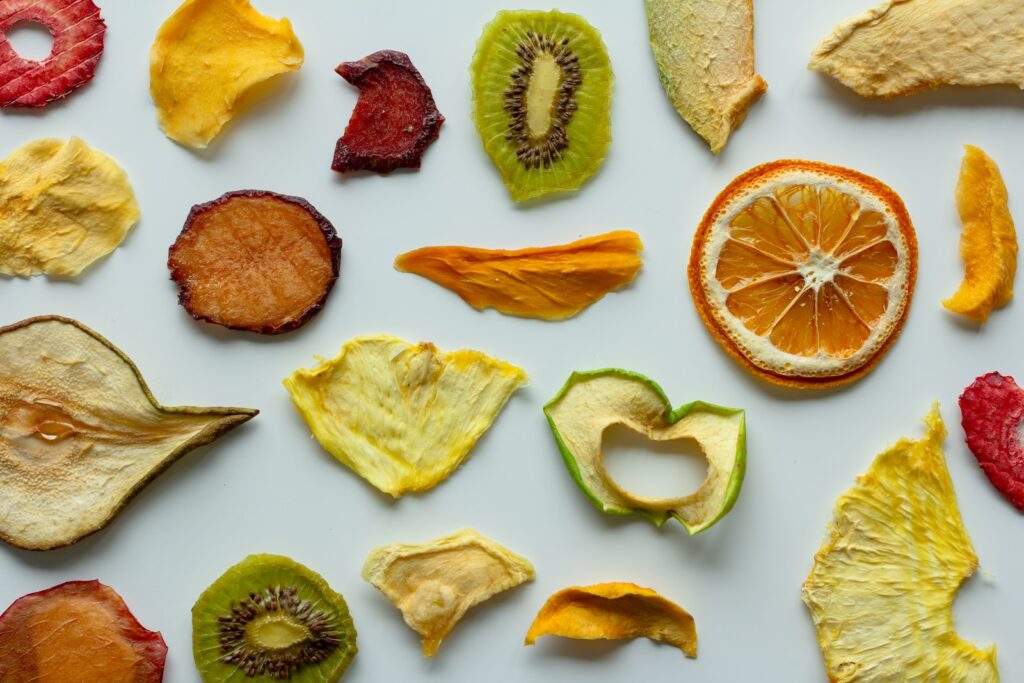
Almonds, cashews, pistachios, raisins, dried apricots or bananas, and dried fruits vary greatly. Due to their low water content, they are a pure concentrate of vitamins, minerals and trace elements, but are also high in calories. Follow the guide to enjoy their benefits!
Among the dried fruits, we distinguish:
“Nuts” or oleaginous fruits are naturally dry and rather rich in lipids – walnuts, hazelnuts, almonds, etc.
Dried fruits, called soft fruits, are fresh fruits that have suffered from dehydration – grapes, apricots, prunes, dates, bananas etc.
Dried oil fruits
Peanut Bowl doesn’t have a good reputation for our line. Yet, peanuts and other nuts from the oilseed family are rich in health-promoting vitamins and minerals when eaten in moderation. Some, like walnuts, are rich in omega 3, contributing to good cardiovascular function.
Notice to seasoned hikers and athletes that the high energy concentration of oleaginous fruits, 600 Kcal per 100 g on average, provides fuel to the body for long-term efforts.
For those watching their cholesterol
Most oleaginous fruits are rich in omega-six and omega-three unsaturated fatty acids and antioxidants, which are beneficial for reducing bad cholesterol levels. The key is not to abuse them because of their high caloric content.
For athletes
The high concentration of minerals such as potassium (as in chestnuts) and magnesium (as in hazelnuts) in oleaginous fruits allow good muscle recovery after exercise.
Caution
Some people are allergic to nuts (peanuts, walnuts, hazelnuts, etc.)
Soft dried fruits
These are dehydrated fruits to which sugar (candied fruits) or lemon juice is often added. Dried fruits combine most of the benefits of fresh fruit in a concentrated way, with a high sugar content. They provide around 3 to 5 times more minerals (potassium, calcium, magnesium, iron, etc.) than fresh fruit.
For better digestion
Dried fruit is rich in fibre (particularly prunes and dates) and promotes intestinal transit and cholesterol elimination.
For athletes
Rich in energy, mainly in the form of sugars, dehydrated fruits also provide high concentrations of minerals, ideal before, during and after sports effort.
Attention: for those who watch their line, they are very caloric, so consume them in moderation.
Each dry fruit has its specificity!
For potassium, essential for muscle contraction: prunes, dried bananas or dried apricots
For magnesium, essential for a good nervous balance: dried banana
For calcium, essential for the maintenance of our bones: dried figs or dates
For iron, anti-fatigue: dried apricot, prune, raisin and dried fig.
When to eat them and how?
One of the great benefits of incorporating dried fruits into your diet is their versatility. They can be added to a wide range of dishes, such as minced beef with a blend of dates and raisins or roast pork with dried apricots. You can also use them when making homemade bread, in salads or smoothies, and even at breakfast in cottage cheese.
Another advantage of dried fruits is their portability. For example, they make an excellent snack on the go, before or after a workout. However, it is important to be mindful of portion control as they are still high in calories. It is recommended to consume about a handful per day.
Despite the numerous benefits, dried fruits are often overlooked in many people’s diets. However, including them in your daily intake can have significant health benefits. They add flavorful depth to main courses and desserts, and their nutritional value is undeniable. Why not incorporate them into your everyday meals and enjoy the benefits of dried fruits?
Focus on dried fruits.
There are several types of dried fruits. Some naturally are. This is the case of those that make up the nut family, in other words, oilseeds. Others are dehydrated fruits. Among them, we find apricots, bananas, grapes and dates. According to our habits, we consume more or less dried fruits. In some kitchens, they are very present. This is the case in Moroccan cuisine which highlights dried fruits throughout the meal.
Seven dried fruits for seven health benefits
Each type of dried fruit has a specific health benefit. Don’t hesitate to mix and match:
- Cranberries for urinary tract health
- Almonds for muscle relaxation
- Brazil nuts to prevent certain cancers
- Macadamia nuts to Lower cholesterol
- Cashews as a natural anti-depressant
- Walnuts for brain and heart health
- Prunes to relieve constipation
Are dried fruits fattening?
Snacking on dried fruit as a snack is a good idea for your figure and health. Not sure.
Dried fruits: the healthiest snacks
It’s a common belief that snacking on dried fruits is healthier than indulging in sugary treats. However, it’s important to be aware that most dried fruits contain a significantly higher amount of sugar than fresh fruits. According to nutritionists, a single serving of dried fruits can contain up to 70 grams of sugar, which is double or triple the amount found in fresh fruits. Therefore, choosing your snacks wisely and being mindful of your sugar intake to maintain a healthy diet is crucial. Do you often snack on dried fruits, thinking they are healthy? Think again. Most dried fruits contain double or triple the sugar in fresh fruits. Nutritionists warn that a single serving can have up to 70 grams of sugar. The sugar in fruits makes you gain weight quickly.
Called fructose, the sugar from fruit can wreak all kinds of havoc on your health: localized and stubborn fat, cholesterol, heart disease, and obesity. In short, fructose, consumed in high doses, is likely to create a lot of damage.
Dried fruits contain much more sugar than fresh fruits.
Dried fruits are, therefore, full of sugar. However, for most of us, a carbohydrate (sugar) intake of 50 grams daily is the limit not to be exceeded, according to the World Health Organization (WHO) recommendations. For comparison, know that a handful of dried fruits can give you more than double the carbohydrates.
They are addictive
We tell ourselves that we will only take a handful, but it is impossible. From the moment you have plunged your hand, you can’t stop: these pesky little dried fruits are addictive. Worse, their fructose prevents your brain from signaling that you are full. The result, you finish the package convinced that you are still hungry!
In case of small cravings, we therefore fall back on healthier snacks and fresh fruit.












